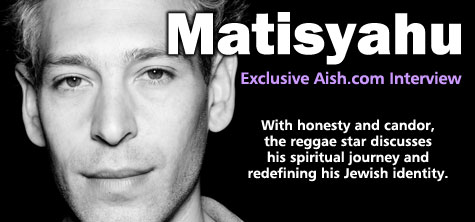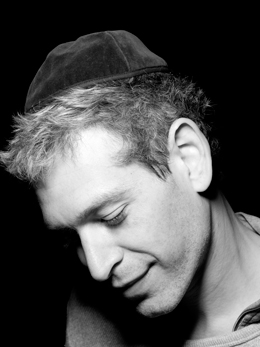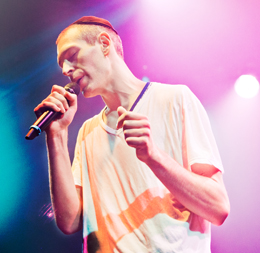 Iran’s Attack on Israel
Iran’s Attack on Israel


13 min read
With honesty and candor, the reggae star discusses his spiritual journey and redefining his Jewish identity.
Matisyahu, the iconic pop reggae star known for his long beard, kippah and peyos (sidelocks), shocked the Jewish world this year by cutting his beard, not always wearing his kippah, and radically changing his “look.” In the following exclusive interview with Aish.com, Matisyahu describes with honesty and candor some of the issues he is going through in redefining his Jewish identity. Although we do not agree with or endorse everything Matisyahu says and does, there is value in getting a glimpse into his spiritual journey which is still in flux – and which in many ways typifies the odyssey that so many go through on their path toward a Torah observant life.
Aish.com: You created quite a stir when you tweeted the photo of yourself beardless and released a statement that seemed in part to imply that you no longer need the rules of Judaism to continue growing as a Jew. Can we set the record straight: Are you still a religiously observant Jew?
 Matisyahu: I am not really interested in classifying myself as this or that, and where I’m at today may change in the future as well. What I was when I shaved has changed to where I am now and, God willing, will continue to change as I evolve. The truth is, it was always ebbing and flowing from when I began my journey in Judaism and it's just that people react to outward appearance.
Matisyahu: I am not really interested in classifying myself as this or that, and where I’m at today may change in the future as well. What I was when I shaved has changed to where I am now and, God willing, will continue to change as I evolve. The truth is, it was always ebbing and flowing from when I began my journey in Judaism and it's just that people react to outward appearance.
I don't really know what the word "religious" means. I believe deeply in God, and if we mean that Torah and Mitzvahs are our guide for the journey, then yes some will call me “religiously observant,” but others will see the external changes I’ve made and say that I am not. Perhaps labels based on these types of externalities are too simplistic, or just convenient. I certainly understand that my position in popular culture lent value to those external elements. My recent changes are part of my own journey, and are not a rejection of the inspiration that gave people.
I am still committed to Judaism, to seeking truth through halacha and observance.
I find a tremendous amount of inspiration and truth within Torah and Judaism, but I had taken on certain minhagim, customs, and stringencies that became habit – either because at one point I had connected to them, or simply because I had been convinced that “religious” Judaism had to look a certain way. Over time some of these external aspects, like the beard, had become deadening and oppressive for me. I had to take a step back.
I am still committed to Judaism, to seeking truth through halacha (Jewish law) and observance, but I needed to reconnect to it in a different manner than I did when I first became "religious." I guess you can say it's been a process of maturing religiously and coming to realize that some of what I took on 10 years ago no longer expresses a part of me. I imagine this is a process many Baal Teshuvas go through. I just get to do it in public.
As Jews we’ve always had the bedrock of Torah, and I’ve grown to see there is a lot of amazing ground within that bedrock. My new record is an expression of this. It is heavily inspired by Judaism. It is filled with inspiration over the last two years of my life from Kabbalah, Chassidut, stories in Yiddish, Hebrew, quotes all over from Tehillim (Psalms), etc. Recently on an online chat, a fan asked me (based on my look, I assume) if I’m still religious, and in that moment I responded that I feel more religious now than I have in months, though many people (based on my recent changes in appearance) will label me less religious.
Aish.com: How did your wife react to the physical transformation? Was it something the two of you had been discussing?
Matisyahu: Ultimately it was my decision to make, and she didn't seem to make a big deal about it.
Aish.com: In an interview you said that the physical change in your appearance was actually the culmination of a series of realizations you had the weeks before. What were you struggling with and what insights did you reach?
Matisyahu: What I meant was, it was not an impulsive decision. It was a result of everything leading up to that moment. There was a moment where I realized for myself that I do not have to be bound to this beard or anything else in life without proper connection, without duty of the heart. I believe that Torah requires us to grow through learning, questioning, and not becoming complacent, and therefore I owed it to myself to re approach some of these stringencies I had taken on 10 years prior.
I also realized that I am free to make my own decisions about my life, that I can think for myself, that Torah needs to address the individual and the thinking individual needs to address Torah. This may seem like a very basic idea, but I had in a sense become stuck by my view of an ultimate reality for about 10 years of my life, I had lost a sense of flexibility within.
Torah needs to address the individual and the thinking individual needs to address Torah.
I remember the moment when it hit me, I was walking down Amsterdam Avenue on the Upper West Side and it felt like I was literally walking out of a jail cell that I had been in. At that moment I realized I could shave if I wanted. It was up to me and no one else. Now it was just a matter of figuring out if I wanted to or not. I had very mixed feelings about it and went back and forth, so it wasn't so easy. After three days of it consuming my every thought, I realized I was breaking the first two commandments. The beard was becoming an idol.
 This does not mean, as some people have seemed to infer, that halacha now has no bearing on my life and choices. But rather I have learned to make certain distinctions for myself where flexibility naturally exists for the Torah-conscious individual. If I choose for that expression to be a beard, etc., that is fine. But feeling bound in it is not a healthy spiritual expression for me at this time.
This does not mean, as some people have seemed to infer, that halacha now has no bearing on my life and choices. But rather I have learned to make certain distinctions for myself where flexibility naturally exists for the Torah-conscious individual. If I choose for that expression to be a beard, etc., that is fine. But feeling bound in it is not a healthy spiritual expression for me at this time.
Aish.com: You have a new record coming out this summer called “Spark Seeker.” What does that title represent to you?
Matisyahu: “Spark Seeker” is about elevating sparks of Godliness stuck in this world, an idea from Kabbalah. I feel that I was given a unique opportunity and gift from God. I am a Spark Seeker, as are many of us.
Aish.com: A large portion of the new record was recorded in Israel. What was the significance of that experience for you?
Matisyahu: There are many great musicians in Israel. It is such an intense and amazing place. It is the crossroads of the universe I feel. Where could be better then Israel to make music? Going to Israel was a turning point in the record. It completely changed the sound of what we had been doing up until that point. It was in Israel that the record began to tell a complete story and find its voice.
Aish.com: On the new record there are a number of people other than yourself saying words of Jewish prayer or giving over “Torah” thoughts. What was the process for choosing these?
Matisyahu: Well each one was different. Sometimes I just knew I wanted a piece of Tehillim (Psalms) in a certain section of a song, so I would scroll through a Psalm until I found something that spoke to me. Most of the time it happened pretty organically. I just know there is so much Godliness these individuals could bring out and add to the record. Just as I didn't tell any of the guest musicians on the record what to play as I trusted their instincts as musicians, I wanted these rabbis to speak what was real to them either based on a song title or simply an idea they felt fit.
Aish.com: Do you consciously try to deliver a meaningful message about Judaism in your songwriting?
Matisyahu: I write about what inspires me. Sometimes it is a piece of Torah, sometimes not. If you believe that Torah is the blueprint of the world, then in a sense anything that is inspiring you--that you see as truth or beauty or wisdom--has its roots in the Torah. I try to find what resonates with me, what's authentic and real for me. I am not in the business of endorsing religion or promoting ideas. I'm a musician and I believe my fans connect to my music on many levels, whether the Torah and Jewish concepts are obvious to them or not. In a sense that is the power of music.
Aish.com: As an artist, how do you balance the need to be “free and experimental” with the “strictures” of a religious life?
Matisyahu: Well that's changed for me over the years. I've let go of some of the stringencies because I was feeling creatively and spiritually choked by how I related to them, and I needed a new approach. This doesn’t mean I have thrown off these customs forever and labeled them useless, nor does it mean that because I’ve changed the physical expression of my Judaism I have therefore changed my connection to much of what has continually inspired me: Shabbos, davening (prayer), kashrut, the emphasis on visiting and comforting the sick, a focus on tzedekah, the list goes on. My guess is that this will continue to change over time.
The concepts and mitzvahs in Judaism are the very things that inspired so much of my music.
But more to the question: The structure of Judaism is not against having an experimental approach to creative pursuits. The concepts and mitzvahs in Judaism are the very things that inspired so much of my music, so in that sense there are many times when the two are meshing and sometimes there is tension between the two.
Aish.com: Your Jewish identity has proved to be a unique, positive part of your public image. Have you ever encountered a downside?
Matisyahu: Well, to those who are not familiar with my music it's also pigeon-holed me in some ways as a gimmick. It's helped and hurt, but to me it was never about what others thought. I've always tried to do what felt authentic to me at the moment and not worry about how it is viewed by others.
I've felt proud to be able to represent Judaism to so many millions of people in this world. I've also felt that while I am heavily influenced by Judaism, I believe my music has been able to connect to humanity at large, which is bigger than representing any one religion or group of people.
Aish.com: What have you learned over your career about the media celebrity machine? And what are some tricks you use to avoid its common pitfalls?
Matisyahu: Obviously I haven't quite figured that part out so well. People will basically project whatever they want onto you. But I try not to let it faze me and just write or talk from my truth. In the end they will do whatever they want and I can't really control that. In the end I have faith in God and His plan for me, not in man.
Aish.com: What inspired you to become more religious originally? What keeps you inspired today?
Matisyahu: I started down the path of Judaism as a result of prayer. I began to pray because I was stuck. I was trapped and I needed a way out and I was at a point where I felt so alone. I needed God. I needed help and I needed love and I didn't know where to get it so I prayed for it. And in a very real sense those prayers were answered. This led me on a journey through Judaism where I began to take on things that were meaningful to me. At some point I became "religious": I sort of gave up on my old self, which had been taking me down a negative path, and I needed distance from that self. I felt I needed to conform to what I was learning in order to grow.
I am now bringing my own individuality and thought into my observance.
At the time I thought that's what I needed, but the process of seriously engaging with Judaism evolves and matures. I am now bringing my own individuality and thought into my observance and reclaiming an element of how I was in the beginning of that process, incorporating that raw desire to simply speak to God in quality and not just quantity. To speak to God from love or pain, and not only from habit or rules. Prayer, my original motivator, is still a major source of inspiration for me today as it was at the beginning of my journey.
Aish.com: How did your parents respond to you becoming religious? How has your spiritual journey impacted them and your relationship with them?
Matisyahu: They were not thrilled as they saw how I was losing an aspect of myself. There was fear but I believed. I believed in God. And I learned about prayer and the depth of Torah and connected to a wellspring of spirituality that has unquestionably inspired and shaped my life and music. Many elements of my spiritual practice today are a direct result of the past 10 years since I started down the Baal Teshuva path. Ultimately I know that God is good. I love Him so much, and as a result I believe that is why my relationship with my parents today is stronger then ever.
Aish.com: Any plans to come perform in Israel in the near future? What’s been your favorite experience in Israel so far?
Matisyahu: I'm sure we'll be back in Israel in the not too distant future. One of the most amazing experiences I've had in Israel was the 10 days making the record last year. We brought in all of these musicians including my dear friend Danny Zamir, who started becoming a Baal Teshuva around the same time as me. I brought over my producer Kojak, who is not Jewish and had never been to Israel. Seeing how Israel affects everyone, how the landscape impacted the shaping of the record was indescribable. So much energy was given to this record from so many different people coming at it from different perspectives – all while we were in Israel for those 10 days. I hope that magic of Israel is obvious when people hear the record.
Matisyahu wanted to give Aish.com readers a chance to hear selected songs from his new record. Click here to stream these selected songs from now until Thursday, and to pre order “Spark Seeker” at special discounted rate.
